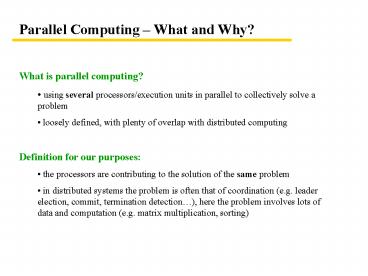Parallel Computing What and Why - PowerPoint PPT Presentation
1 / 7
Title:
Parallel Computing What and Why
Description:
thread level parallelism Hyperthreading in Pentium IV ... (wide issue, multimedia instructions, hyperthreading), and this bit is growing. ... – PowerPoint PPT presentation
Number of Views:54
Avg rating:3.0/5.0
Title: Parallel Computing What and Why
1
Parallel Computing What and Why?
- What is parallel computing?
- using several processors/execution units in
parallel to collectively solve a problem - loosely defined, with plenty of overlap with
distributed computing - Definition for our purposes
- the processors are contributing to the solution
of the same problem - in distributed systems the problem is often that
of coordination (e.g. leader election, commit,
termination detection), here the problem
involves lots of data and computation (e.g.
matrix multiplication, sorting)
2
Why do we need powerful computers?
- To solve much bigger problems much faster!
- Performance, performance, performace
- there are problems which can use any amount of
computing (i.e. simulation) - Capability
- to solve previously unsolvable problems
- too big data sizes, real time constraints
- Capacity
- - to handle a lot of processing much faster,
perform more precise computer simulations
3
Why are powerful computers parallel?
- From Transistors to FLOPS
- by Moores law the of transistors per area
doubles every 18 months - how to make use of these transistors?
- more execution units, graphical pipelines, etc.
- more processors per die
- The Data Communication Argument
- for huge data it may be cheaper/more feasible to
move the computation towards data - The Memory/Disk Speed Argument
- parallel platforms typically yield better memory
system performance, because they have - larger aggregate caches
- higher aggregate bandwidth to memory system
4
A bit of historical perspective
- Parallel computing has been here since the early
days of computing. - Traditionally custom HW, custom SW, high
- The doom of the Moore law
- custom HW has hard time catching up with the
commodity processors - Current trend use commodity HW components,
standardize SW - Market size of High Performance Computing
- the market size for disposable diapers
- (Explicitly!) Parallel computing has never been
mainstream.
5
A bit of historical perspective (cont.)
- Parallelism sneaking into commodity computers
- Instruction Level Parallelism - wide issue,
pipelining, OOO - data level parallelism SSE, 3DNow, Altivec
- thread level parallelism Hyperthreading in
Pentium IV - Transistor budgets allow for multiple processor
cores on a chip. - Most applications would benefit from being
parallelised and executed on a parallel computer. - even PC applications, especially the most
demanding ones - games, multimedia
6
A bit of historical perspective III
- Chicken Egg Problem
- Why build parallel computers when the
applications are sequential? - Why parallelize applications when there are no
parallel commodity computers? - Answers
- What else to do with all those transistors?
- They already are a bit parallel (wide issue,
multimedia instructions, hyperthreading), and
this bit is growing. - Yet another reason to study parallel computing
- Principles of parallel algorithm design (locality
of data reference) lend themselves to
cache-friendly sequential algorithms. - The same applies for out-of-core computations
(data servers).
7
The beauty and challenge of parallel algorithms
- Problems that are trivial in sequential setting
can be quite interesting and challenging to
parallelize. - Very simple example Computing sum of n numbers
- How would you do it in parallel?
- using n processors
- using p processors
- when communication is cheap
- when communication is expensive































